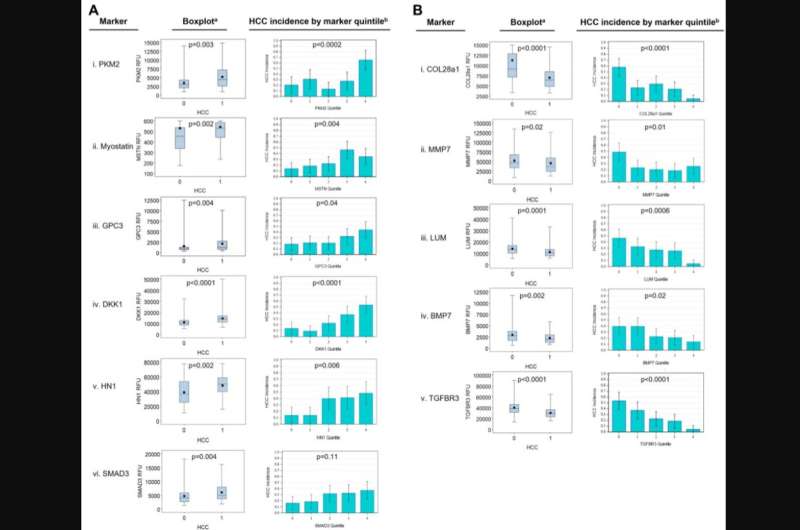This article has been reviewed according to Science X's editorial process and policies. Editors have highlighted the following attributes while ensuring the content's credibility:
fact-checked
proofread
Mechanistically-based blood proteomic markers may be able to stratify risk for hepatocellular carcinoma

Hepatocellular carcinoma (HCC) is the third leading cause of death from cancer worldwide but is often diagnosed at an advanced incurable stage. Yet, despite the urgent need for blood-based biomarkers for early detection, few studies capture ongoing biology to identify risk-stratifying biomarkers.
In a new study, researchers address this gap using the TGF-β pathway because of its biological role in liver disease and cancer, established through rigorous animal models and human studies.
Their research paper has been published in Genes & Cancer, titled, "Mechanistically based blood proteomic markers in the TGF-β pathway stratify risk of hepatocellular cancer in patients with cirrhosis."
"Alterations in the TGF-β signaling pathway could reflect a continuum of fibrosis to cirrhosis to cancer in the liver. Thus, we hypothesize that the TGF-β pathway-enriched biomarkers may serve as biomarkers in the evolution of HCC and stratify patients at risk for HCC. In addition, we hypothesized that the integrated animal model-to-human studies program would yield new TGF-β driven mechanistic biomarkers that could be valuable in yielding additional biomarkers that could stratify the risk of HCC," say the researchers.
Using machine learning methods with blood levels of 108 proteomic markers in the TGF-β family, the team found a pattern that differentiates HCC from non-HCC in a cohort of 216 patients with cirrhosis, which they refer to as TGF-β based protein markers for early detection of HCC (TPEARLE) comprising 31 markers.
Notably, 20 of the patients with cirrhosis alone presented an HCC-like pattern, suggesting that they may be a group with as yet undetected HCC or at high risk for developing HCC.
In addition, the researchers found two other biologically relevant markers, myostatin and pyruvate kinase M2 (PKM2), which were significantly associated with HCC. They tested these for risk stratification of HCC in multivariable models adjusted for demographic and clinical variables, as well as batch and site. These markers reflect ongoing biology in the liver.
"They potentially indicate the presence of HCC early in its evolution and before it is manifest as a detectable lesion, thereby providing a set of markers that may be able to stratify risk for HCC," say the authors.
The researchers include Xiyan Xiang and others, from The Feinstein Institutes for Medical Research, Cold Spring Harbor Laboratory, University of Maryland, University of Hawaii, University of Hawaii Cancer Center, The George Washington University, North Shore University Hospital, Northwell Health, Hofstra Northwell School of Medicine, Cleveland Clinic, and Georgetown Lombardi Comprehensive Cancer Center.
More information: Xiyan Xiang et al, Mechanistically based blood proteomic markers in the TGF-β pathway stratify risk of hepatocellular cancer in patients with cirrhosis, Genes & Cancer (2024). DOI: 10.18632/genesandcancer.234




















